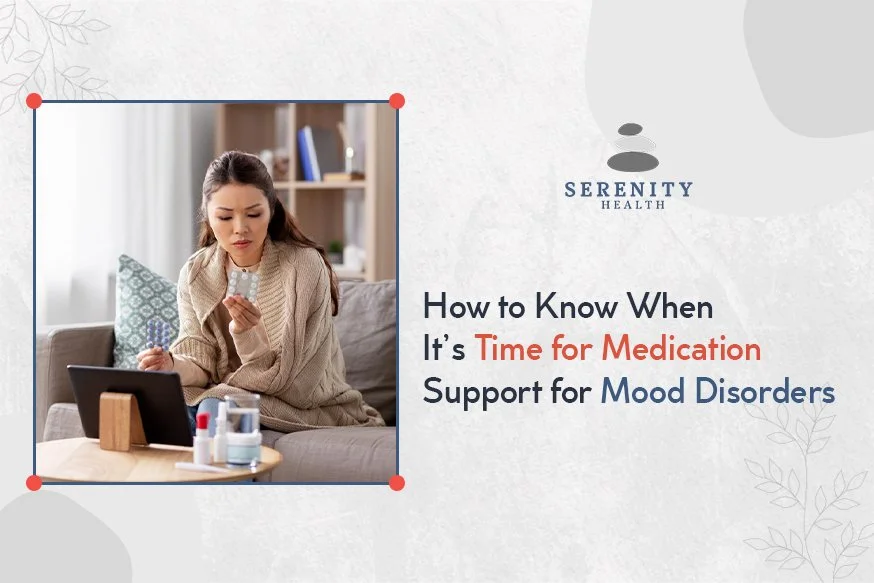How to Know When It's Time for Medication Support for Mood Disorders
Perhaps you have long been wondering about this. The idea comes to your mind in some especially rough weeks, and dies away when things feel reasonable again.
But it still returns, this query of whether medication will help.
When Everything Else Falls Short
You've put in the work. Some days are better than others, but there's this constant weight that won't lift.
You function, but it takes everything you have.
Medication becomes worth considering when daily life consistently feels like too much. Not just bad days - everyone has those. Rather, when weeks turn into months and you're still fighting the same battles with the same exhaustion.
Signs Worth Paying Attention To
Sometimes we're the last ones to notice how much we're struggling. These patterns might mean it's time to explore medication:
Basic routines require enormous effort
Sleep problems persist despite good habits
Concentration has become genuinely difficult
Relationships feel strained from your mood shifts
Physical symptoms keep showing up without clear cause
Previous coping methods stopped working
Your situation doesn't have to be dramatic to matter. Consistent low-grade suffering counts, too.
What Medication Actually Offers
Medications don't fix everything or change your personality. They help with particular chemical imbalances that complicate emotional regulation.
When something's off in your brain chemistry, will power alone can't correct it.
Good medication support means you have more capacity. Tasks don't feel insurmountable. Emotions still happen, but don't knock you sideways for days.
You can actually apply the skills you've learned instead of just surviving.
Related: Is It Safe to Stop Taking Psychiatric Medication on Your Own?
How Serenity Health Handles Care
Located in Carmel, this practice takes a different approach. We see each person completely, rather than just seeing symptoms on a checklist.
Our provider spends real time understanding your history and what's happening in your life right now.
One standout service we offer is GeneSight testing.
Your genetics influence how you process different medications, and this test provides actual data about what medications are likely to work for your body.
GeneSight testing removes much of the usual trial period where you're switching prescriptions every few weeks, hoping something clicks.
We've thought through practical barriers, too. We offer after-school appointments for people with kids or day jobs. Telehealth visits are available after you've completed your initial in-person meeting.
We also offer a patient portal where you can request follow-ups, without playing “phone tag.”
Timing Matters
Certain situations call for quicker action:
Thoughts about harming yourself appear regularly
Work or school performance has clearly declined
You've withdrawn from most social connections
Substances have become your go-to coping method
Someone close to you has expressed real concern
You already have a diagnosis, but no active treatment
Waiting for rock bottom isn't necessary. Earlier intervention typically leads to smoother progress.
The First Appointment
Walking in feels vulnerable. We will talk through your medical background, family history with mental health, symptoms you're experiencing, and what medications you've already tried.
Providers need this full picture to recommend what medication makes the most sense.
Expect discussion about:
Different types of medications and their mechanisms
Realistic timelines for noticing effects
Possible side effects worth monitoring
How adjustments happen if needed
Nothing gets decided without your input. This is collaborative from the beginning.
Rethinking the Decision
Some people view needing medication as a failure. But consider this: would you refuse glasses if your vision was blurry?
Would you skip antibiotics for an infection because you should just power through?
Mental health deserves the same practical approach we take with physical health. If medication helps you function better and feel more stable, that's a legitimate tool worth using.
Serenity Health's entire philosophy centers on patient-centered care with clinical backing.
We integrate solid medical practice with genuine respect for each person's experience. Our methods are evidence-based, meaning proven approaches guide our recommendations.
Moving Forward
You don't have to keep white-knuckling your way through. Help exists specifically for what you're dealing with. We at Serenity Health understand mood disorders from both clinical and human perspectives.
Our location in Carmel offers accessible care without the institutional feel that makes some places uncomfortable.
The practice is set up to actually work with your schedule and needs, not force you into rigid systems.
Call us at (463) 240-1670. Have the conversation. See what options exist for your situation.
That first contact is sometimes the most difficult step; however, it is also the step that can transform the rest of your life.
FAQs
Does starting medication mean I'll need it indefinitely?
Each person's path differs. Some benefit from medication during specific difficult periods, whereas others find long-term use works better. Your provider discusses this openly, based on how you respond and what your goals are.
How soon can I expect to feel different?
Timing varies by medication type and individual response. Some notice shifts within two weeks, whereas others need six weeks for full effects. Regular check-ins help track what's happening.
What happens if the first prescription isn't right?
Adjustments are normal. GeneSight testing helps identify better matches upfront, but sometimes fine-tuning is still necessary. Your provider works with you through the process until you find what helps.

